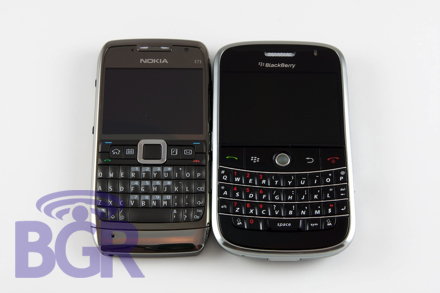Nokia E71 Vs. BlackBerry Bold: The QWERTYs Rip Each Other To Shreds
In the latest chapter of "response to the onslaught of reader's requests," we've decided to put the Nokia E71 and the BlackBerry Bold head-to-head. While both are totally different breeds of devices, they do share a number of similarities and are targeted to the same demographic. You've got two enterprise handsets with QWERTY keyboards, cameras, Wi-Fi, 3G, corporate email, great battery life, etc. Click on through to see which device wins out in this epic showdown of QWERTY gone violent.
We used some of the information from our Bold vs. iPhone post since in most cases it was exactly the same.
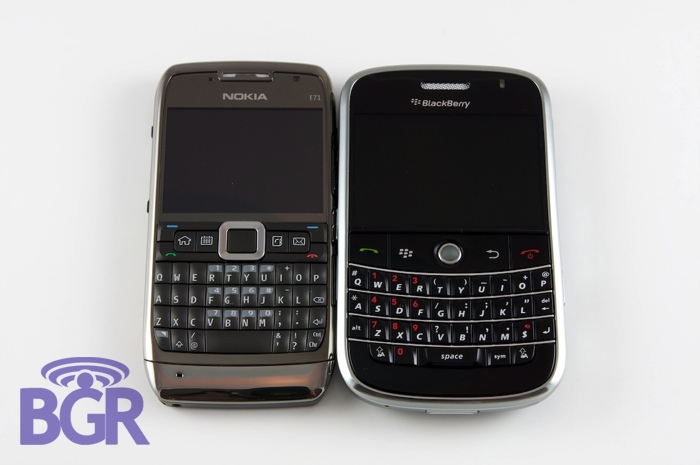
Design
BlackBerry Bold:
Some could agree the Bold is the sharpest and cleanest-looking BlackBerry ever to come out of Waterloo. With a complete black face, chrome border and sides, and faux black leather back, the device looks great. From all the matching chrome accents all over the phone to the simple and not confusing layout, RIM has designed a great BlackBerry which should set the bar for future devices down the road.
Nokia E71: Nokia, Nokia, Nokia...aw, who are we kidding? The E71 is one of the nicest designs to have come out of Espoo as of late. With a real metal structure (read: plastic BlackBerry Bold), great materials, and some pretty slick engineering, the E71 looks awesome. Well, except for the vicious red power button. Totally ruined it for us, Noke.
Build quality
BlackBerry Bold:
The BlackBerry Bold is built extremely well. Not including minor screen scratches and things of that nature, the Bold should be able to last you as long as you want to keep the thing. The unit is a little lighter than it looks and there no creaks or anything to get you worried about. The only negative thing we'd have to say, it that the build quality on the BlackBerry Curve slightly trumps the Bold. We'd ever go as far to say that the 8800 does too. But not the Pearl. Hell no.
Nokia E71: Again, Nokia hits it out of the park. Nokias have great build quality for the most part across the board, as do BlackBerrys, but the E71 is built like an absolute tank. Literally. We don't think we could break this thing if we tried.
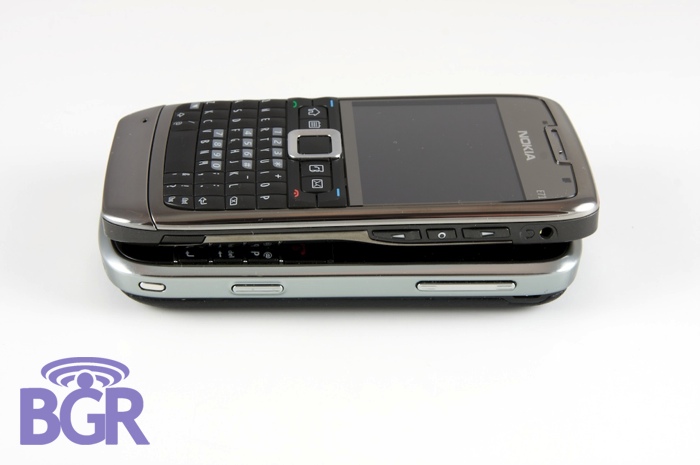
Size
The Bold is the biggest BlackBerry to be released in a pretty long time. Well, since the 8700. It is larger in every way than the BlackBerry 8800 and can sometimes feel a little hard to hold in one hand. It's definitely no Curve. Comparing it the E71, the E71 feels much better when holding it, but since the Bold's keyboard makes use of the larger size, we're going to call this one a tie because of the pretty comfy Bold QWERTY.
Nokia E71: If you had to shrink 3G, Wi-Fi, GPS, a camera, physical QWERTY keyboard, and other components into the smallest package possible, what would get? Most likely an E71. We don't think the device could be any smaller, though the small size does hinder the QWERTY keyboard slightly. Everything else is well balanced, and it makes the Bold seem like this huge Dark Knight hovering over it, jealous it can't shed a couple inches on its waistline.
Screen:
We're sticking to the "BlackBerry Bold's screen is the best. mobile. device. screen. ever." line. Sorry, Nokia, but the E71s screen as decent as it is, can not hold a candle to the Bolds rich, sharp, and spaceous display.
OS
BlackBerry Bold:
This is a tricky and sensitive subject for a lot of people. Many of us live and die by the BlackBerry OS. Some could say we even know it better than we know some of our significant others... But therein lies the problem. While RIM has been on a mission to revamp the BlackBerry from the old school "pager" into an all-in-one communications device for consumers and business alike, we can't help but wonder when the OS will get a real makeover. Not a Mariah Carey cover page airbrushed makeover, more like a Carnie Wilson 300lbs to 150lbs makeover. But, we do have to say that RIM has a great thing going. The BlackBerry minions have figured out every single tip and trick there is to squeeze every ounce of usability out the operating system, and for a lot of people, the OS is fine. It does what it is supposed to, and there is nothing wrong with that. It's just that the market has changed so drastically in the last year and half. People want to be connected more, they want to do more while doing less.
Nokia E71: S60, huh? We'd have really liked to see FP2 make it to the E71 out of the gate. Anyone that's not a current Nokia user might have a bit of trouble dealing with access points, configuring their email, and getting around. This is a tricky subject as there are no doubt some die-hard Nokia fans, but we'd so S60 is showing its age a lot at this current point in time, just as RIM's OS. What you do get with S60, however, is a ton of great 3rd party applications. We think you'd hard pressed to find more than 10-15 useful applications for the BlackBerry platform, whereas you have thousands for S60.
Call quality / RF performance
This has been explored before, but we find the Nokia E71 to be one of the worst performing Nokia handsets in the RF department. That compared to the outstanding reception on the Bold leaves us without too much faith that the E71 will be able to handle our daily usage in low signal areas. In terms of call quality, the Bold did a much better job at delivering us a clear and loud call, while the E71 often garbled our voice to the party on the other end. Speakerphone was the same with the Bold performing better than the E71.
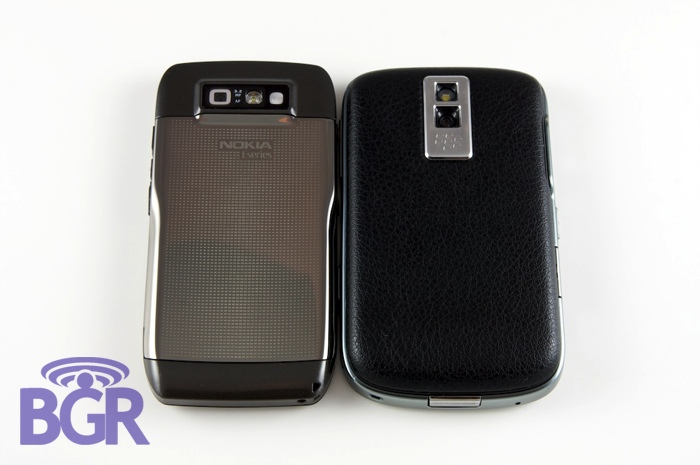
Battery life
You'd be surprised, but we've found the Bold and E71 to go toe for toe in our battery tests. They both last longer than any other 3G device we've used, but to be fair, since the E71 isn't the best RF signal holder, the Bold was on 3G more than the E71, and the E71 was rarely on Wi-Fi. We say the Bold inches out the E71 in the battery department.
BlackBerry Bold:
Listen, you can't throw around the word "BlackBerry" without thinking about email. That's RIM bread and butter, and we don't see that changing for a very long time. There are probably 500 competitors vying for the title of "Best. Email. Ever.", but they're not coming close anytime soon. While Windows Mobile offers some of the same feature-set, there is nothing like using a BlackBerry for email. From changing your out of office message, to configuring email filters on the go (what, you think we actually get all 6,000 comments from our iPhone 3G giveaway post on our BlackBerry?), to remote searching (awesome!), RIM has perfected email on the BlackBerry for the most part. When new features like full attachment viewing and HTML get introduced, though, it gets a little murky. Instead of viewing attachments natively off the bat on your BlackBerry, RIM's data network will compress and send you what you need bit by bit. There is also a clear separation between RIM's BES services and BIS services, and they are totally unnecessary. There is no reason we should have the ability to view HTML on BIS, but not on BES yet (unless you hacked that in), and there is no reason file type support is so convoluted. For instance, we can listen to our voicemail MP3s on our BIS email, but not on BES because even the latest BES service pack still doesn't support the encoding used in our MP3s. Things like this really confuse users and there's no reason for it. BIS features should mirror BES features as much as possible and be upgraded at the same time. If we have to email an attachment from our BES to one of our BIS email accounts one more time...
Nokia E71: Email is email for Nokia. There's no HTML support, there's really not a lot of configurable options when using an Exchange server, and the email application isn't the most reliable thing under the sun in general. As far as comparing it to email on a BlackBerry... well, we won't even go there. It would take a couple more days to list all the issues and inconsistencies with Nokia's default email application. We're not saying it's terrible, it is definitely usable, but it's not something we'd like to use. Get it?
Keyboard
Another tricky subject. You've got the Bold which mashes up the Curve, the Pearl, and the 8800's keyboard, and you've got the E71 which takes its cues from the E61i. If we could fault the E71's keyboard, it would be that it is a little too small to use 100% comfortably. We'd also point out the stupidity of their keyboard layout once again. Get it through your heads, the "Z" key NEVER goes directly under the "A" key. That's not how it's done, boys. The keyboard does give you a nice response when pushed, and the keys are a bit on the hard side, but that actually works well on the phone. With the Bold, we find ourselves banging away emails like we've always done — that's great. RIM didn't mess with success here.
Corporate usage
BlackBerry Bold:
RIM has made the BlackBerry the hands-down winner for a perfect desktop extension. Pretty much whatever you can do from Outlook on your Exchange server, you can do from your BlackBerry. In addition to looking at the device specifically, RIM's BES server offers the now standard way of managing, controlling, and deploying devices across a corporate infrastructure. Their BES servers allow IT admins to tweak and configure every possible setting, making this is the ideal solution for mid-to-large businesses and government agencies. RIM's focus on security also make the BlackBerry the most secure device on the planet to use in a corporate environment.
Nokia E71: And dropped BlackBerry Connect again why? Not a good idea, guys. At least as far as the U.S. market is concerned. You had a device which would have been bought by the pound and used by a lot of corporate executives along with their BES, giving them an opportunity to venture outside of the immediate BlackBerry world. You now have to deal with people buying devices personally for the most part, and at + / – $500 with no discount for corporate volume purchases, it's going to be a tough sell. Especially considering MailForExchange's shortcomings.
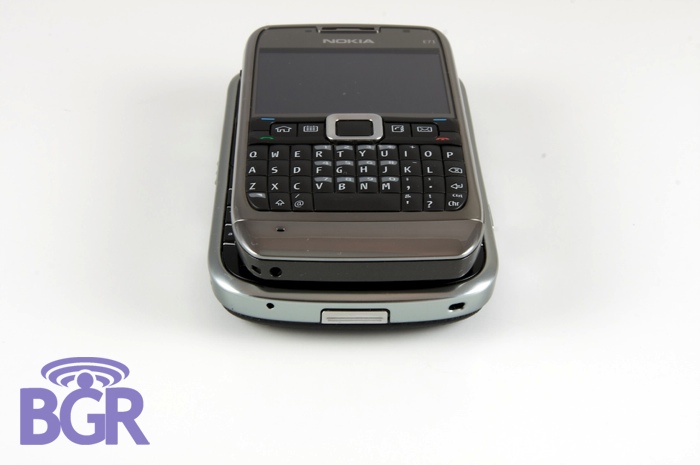
Pricing:
BlackBerry Bold: The Bold's pricing hasn't been revealed yet, but it's going to be in the $199-$299 price range with a two-year agreement. Or three if you're unlucky to be a slave to Ted Rogers.
Nokia E71: The E71 is priced at $499 at Nokia stores directly, but you most likely can find it for around $420-$475 depending where you shop.
Conclusion:
It's a little hard to put this but... we absolutely loved the Nokia E71. It was the best S60 we'd ever used. And it still is, some would argue. There is no doubt it is the finest QWERTY device Nokia has made. Don't bring up the E90, ok? Even though we had used a Bold prior to our Nokia E71 first review, it wasn't until we had both devices together that we really had our mind change. This is a personal opinion here, but the BlackBerry Bold smokes the E71 out of the water in so many ways. The E71 is fine as a personal communication device, but once you enter into the realm of corporate email, or even small business, for that matter, the Bold is the reigning king, and will stay that way for a pretty long time.
